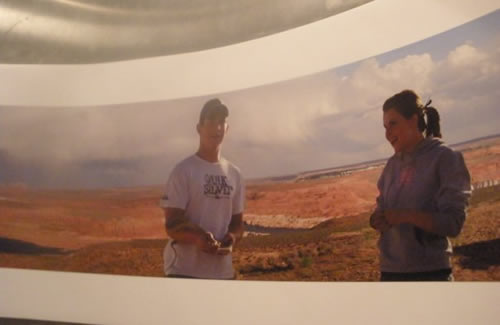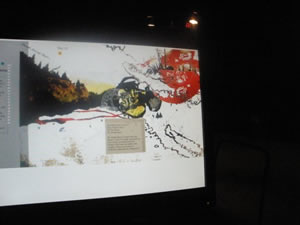Unknownterritories and The Harvest
Roderick Coover

UNKNOWNTERRITORIES.
The traveler transforms perceptions into narratives and places into imagined spaces -- spaces in which the traveler grasps both a sense of the temporal moment and imagines the potential trajectories that the events of any moment might hold. When John Wesley Powell navigated the Colorado River in 1869 and began a project of mapping the western deserts, he envisioned what the desert landscape might look like populated with settlers. He argued for sustainable growth and was expelled from office. About 100 years later, writer  Edward Abbey encounters a very different West. The land is owned, mapped, gridded, dammed, mined and crisscrossed with roads, paths and pipelines. The writer walks the canyons to re-imagine a desert landscape. He draws attention to the destruction of the land including the construction of dams that flooded and buried the natural and cultural sites John Wesley Powell once wrote about. His works give record to a 1960s and 1970s culture of desert environmental activism and rebellion. Viewers explore the processes that led Abbey and his local community to make the choices they did -- choices grounded in an American tradition that goes back to the Boson Tea party: direct action and sabotage. These new works have been featured in galleries and online venues. An online discussion will be held Sunday at 1030am in conjunction with an exhibition funded by Subito (www.subitopress.org).
Edward Abbey encounters a very different West. The land is owned, mapped, gridded, dammed, mined and crisscrossed with roads, paths and pipelines. The writer walks the canyons to re-imagine a desert landscape. He draws attention to the destruction of the land including the construction of dams that flooded and buried the natural and cultural sites John Wesley Powell once wrote about. His works give record to a 1960s and 1970s culture of desert environmental activism and rebellion. Viewers explore the processes that led Abbey and his local community to make the choices they did -- choices grounded in an American tradition that goes back to the Boson Tea party: direct action and sabotage. These new works have been featured in galleries and online venues. An online discussion will be held Sunday at 1030am in conjunction with an exhibition funded by Subito (www.subitopress.org).
For more information about unknown territories, visit the project: www.unknownterritories.org.
THE HARVEST
THE HARVEST is a photographic study of the Burgundian vendange recorded in the village of Bouzeron in the Cote Chalonaise. The installation employs four bands of images and text each using differing compositional forms to incorporate various stages of production and representation in a finished work. This series and the related film, The Language of Wine, explore how the terminology of a metier can serve as metaphors in the individual expression of personal views and goals The work was supported with funding from the Chicago Group On Modern France and elsewhere and the film has been featured in electronic media arts exhibitions and film festivals such as Documenta Madrid. Elements of this work are published in the CD-ROM Cultures In Webs: Working in Hypermedia With The Documentary Image (Eastgate.com) and as the DVD, The Language Of Wine (www.Languageofwine.com).
Biography
Roderick Coover creates documentary films, interactive environments, and multimedia installations. In Unknown Territories Series (Unknownterritories.org) users navigate virtual representations of the Colorado River basin in the western United States following paths laid out my explorers, photographers and writers. Works such as Something That Happened Only Once, Vacation Series, and Outside/Inside investigate questions of continuity, storytelling and the expression of the sense of place. These works employ panoramic techniques. Works such as the CD-ROM, Cultures In Webs: Working In Hypermedia With The Documentary Image (Eastgate), the DVD From Verite To Virtual: Conversations on the Frontier of Film and Anthropology (Documentary Educational Resources) and the forthcoming book Switching Codes (Chicago) examine relationships between visual practices and scholarly research practices. His other films include The Theory of Time Here (Video Data Bank) and The Language Of Wine: An ethnography of work, wine and the senses, which explores how the words of an occupation -- wine making in Burgundy -- shape the metaphors lives are lived by. Coover exhibits his work internationally and has published in journals such as Ethnographiques, Visual Studies, Visual Anthropology, Film International and Film Quarterly, among others. Coover is an associate professor at Temple University.
link: www.roderickcoover.com
The artist thanks the Monell Chemical Senses Center and Temple University for their material contributions to this work.